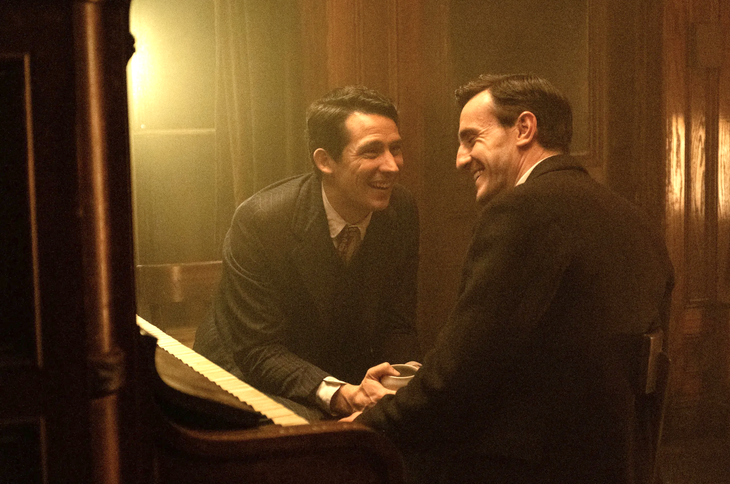
Josh O'Connor and Paul Mescal in the film "The History of Sound" - Photo: DPCC
In his old age, ethnomusicologist Lionel Worthing, played by Paul Mescal in Oliver Hermanus's film *The History of Sound*—nominated for the Palme d'Or at this year's Cannes Film Festival—is asked by a student why he loves folk music, and he explains that it is music that ignites passion.
The history of sound
During his student years, Lionel studied at a music conservatory in Boston. He met a fellow student named David (Josh O'Connor) who was playing a folk song in a pub, which reminded him of his farm home. Lionel sang a folk song for David in return. The two boys immediately took a liking to each other.
When World War I broke out, David had to enlist, and the two were separated. Years later, David returned and invited Lionel to travel with him to the countryside, bringing along wax cylinders to record the folk songs of farmers who were being pushed to the margins of modern society.
But then they went their separate ways. When Lionel went to find David, he learned that David had gotten married and had committed suicide due to post-war trauma.
The History of Sound – the title means the history of sound, a title that sounds very grand, inviting us into a grand narrative. But there is no grand narrative there.
Set against the backdrop of a world-shaking period, the story told is merely an inside look at that history, with fragments of songs, lives, sorrows, and loves—of people whose absence would have made no difference whatsoever to history.
The history of sound trailer
Much is lost to oblivion.
Throughout the film, we hear ordinary people singing, singing about the suffering that is always present in small, remote towns. For example, they lament the pain of separation: "Oh, the snow melts fastest when the wind begins to sing, and the corn ripens earliest when the frost has just fallen" (The Snow It Melts The Soonest).
They express their feelings about the burdens of life: "O my soul, let us try for a moment to set aside all our burdens" (Grieved Soul); they sing about their humble condition: "In the Lord's vineyard, I will live and work, obedient to God until the hour of my death" (Here In The Vineyard).
What is sound? In a memorable scene, the two main characters explain sound to a rural child by telling him to put his hand to his throat, try humming, and the vibrations his hand feels are sound.
Therefore, music has limits, while sound has limits.
Every landscape and image that appears in the film seems to be emitting some kind of sound wave, not just limited to guitars or songs, but also emanating from the dry branches in the freezing winter, the eggs the two boys fry for each other on the rocky outcrop during their journey, the embers rising into the air and then extinguishing in the darkness of night, and even the lost old letters.
Everything vibrates, everything moves, and therefore everything makes a sound—sounds that will fade into oblivion because no one will record them. We have lost so much to oblivion.
And of course, love has a sound. Many years later, when the wax cylinder that David had kept, thought to be lost, suddenly appeared at Lionel's doorstep. Now an old man, Lionel opened it and listened to each cylinder, and when David's voice echoed from one of the cylinders, Lionel was overcome with emotion.
David sang the folk song "Silver Dagger" that they had sung to each other the first time they met. David's voice was broken, raw, and rough; it couldn't really be called music, just the sound of singing. But as I said, sound has no limits, no standards. That's why it's like love. It exists everywhere, and is endless.
We often think of music as a higher, more complex, and deeper form of sound. But the film doesn't call folk songs musical history; they call it sound history. Because music requires sophistication and performance, while sound does not.
Source: https://tuoitre.vn/di-tim-am-thanh-da-mat-20251109102933115.htm


![[Photo] General Secretary To Lam receives President of the European Council Antonio Costa](/_next/image?url=https%3A%2F%2Fvphoto.vietnam.vn%2Fthumb%2F1200x675%2Fvietnam%2Fresource%2FIMAGE%2F2026%2F01%2F29%2F1769697816651_a1-bnd-5216-9741-jpg.webp&w=3840&q=75)
































































































![OCOP during Tet season: [Part 3] Ultra-thin rice paper takes off.](/_next/image?url=https%3A%2F%2Fvphoto.vietnam.vn%2Fthumb%2F402x226%2Fvietnam%2Fresource%2FIMAGE%2F2026%2F01%2F28%2F1769562783429_004-194121_651-081010.jpeg&w=3840&q=75)


![OCOP during Tet season: [Part 2] Hoa Thanh incense village glows red.](/_next/image?url=https%3A%2F%2Fvphoto.vietnam.vn%2Fthumb%2F402x226%2Fvietnam%2Fresource%2FIMAGE%2F2026%2F01%2F27%2F1769480573807_505139049_683408031333867_2820052735775418136_n-180643_808-092229.jpeg&w=3840&q=75)





Comment (0)